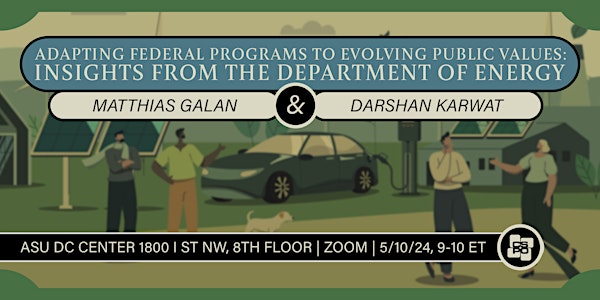Changing public values can be difficult to navigate for public funders when designing funding instruments. This is why we want to look at how federal programs keep up, assess, and incorporate changing public values and priorities. We will discuss lessons from an energy and environmental justice (EEJ) initiative at the Department of Energy (DOE).
Critics have argued that bureaucratic processes can be the ‘burial ground for public values’.* 1 However, federal programs have adjusted to policy change by integrating new core values (i.e., public health, energy, and the environment) into funding mechanisms and their merit review processes. With the recent executive order on ‘Tackling the Climate Crisis at Home and Abroad’ (EO 14008), environmental and energy justice (EEJ) have become a new set of values to be integrated in the context of the Justice40 initiative.
Looking at the case of the Water Power Technologies Office (WPTO), we will discuss how program managers translate new EEJ values into funding instruments and merit review processes. WPTO is an entrepreneurial technology office at the DOE with a broad portfolio of socially and ecologically impactful technology ranging from hydroelectric power stations to tidal energy plants. The case study is based on findings from interviews with program managers, applicants, and merit reviewers. The session will look at the challenges and opportunities of addressing EEJ in funding instruments and the merit review process.
The event will address the following questions:
· How can program managers integrate new public values into their portfolios?
· How should the peer review process in place adjust to account for new values?
· Which guiding principles should be in place when addressing emerging public values? (i.e., human rights, sustainable development goals, etc.)
Further information:
Oonk, David and Darshan MA Karwat. 2023. Practical Approaches To Embed Energy and Environmental Justice Into DOE Technology Portfolios. Link
*Bozeman, B., & Sarewitz, D. (2011). Public Value Mapping and Science Policy Evaluation. Minerva, 49(1), 1–23. https://doi.org/10.1007/s11024-011-9161-7
